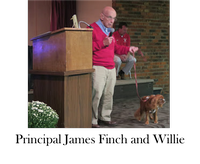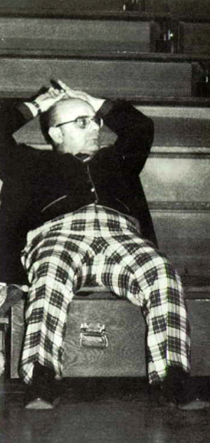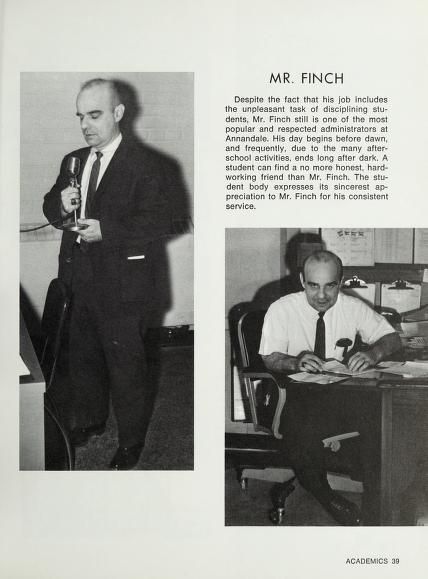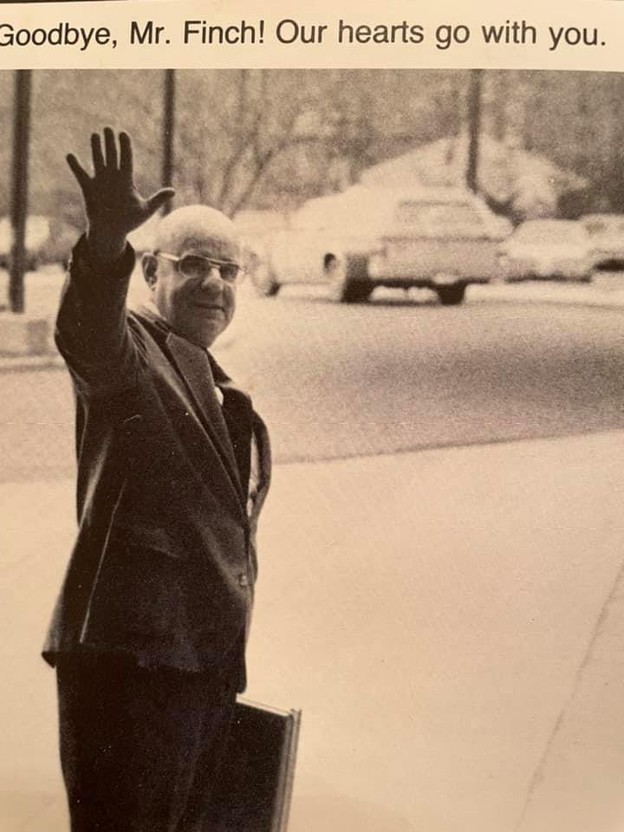|

 Did you ever see Mr. Finch this comfortable and stylish? Did you ever see Mr. Finch this comfortable and stylish?
James Finch – Served at AHS 1957-86. Coached many sports, taught history, and was principal 1966-86. Finch said, Annandale High School is “a very, very special place because of the people in the community”
FaceBook Group
Farewell Mr. Finch, former Annandale HS principal
Jim Finch, the much-admired principal of Annandale High School from 1966 to 1986, died Feb. 18 at an assisted living facility in Hendersonville, N.C. He was 92 and suffered from a variety of ailments.
He “passed away peacefully in the presence of his loving family,” his daughter Dana Conlon reported on Facebook.
“Not only did he love his students, he loved his faculty, his support staff, and parents,” Conlon wrote. “He considered them equal partners in the success of the AHS community. Dad loved to hire former students as teachers, coaches, and support staff. Once an Atom, always an Atom!”
Finch joined the Annandale faculty in 1957 as a history teacher and coach and was named assistant principal in 1960.
In 2018, Finch was among the first group inducted into the Annandale Athletic Boosters Hall of Fame.
Every year, the Annandale PTSA awards the James Finch Service and Leadership Scholarship to a student who has demonstrated outstanding leadership, school spirit, and community service.
Finch grew up in Greensboro, N.C. He served as student body president in high school. He graduated from Guilford University, joined the Navy, then earned a master’s degree in history from the University of North Carolina in 1954. He was a member of the Naval Reserve, retiring in 1970 with the rank of commander.
Finch spoke his time at Annandale High School in an interview for the Oral History of the Principalship conducted by Virginia Tech in 1987.
At the beginning of his time as principal, AHS was part of a community where most people owned their own homes and took pride in their school, he recalled. It was like a family – “a family of teachers and students and the community.”
A key part of the community’s support for the school was due to the Annandale Atoms powerhouse football team, which won five state championships during Finch’s tenure (and a sixth in 1993) and won the National Championship in 1978.
Over the decades, the community became more transient as apartments were built in Annandale, and the population became increasingly diverse, he recalled.
Related story: Former Annandale High School students reconnect at 30th reunion
“Annandale was still a good school. There are still many things there that are very positive. And the thing that both my predecessor and I tried to present about Annandale was that the good years were still ahead,” he said. Finch was the second principal of Annandale, following Ralph Buckley, who was principal when the school opened in 1954.
Finch described his leadership philosophy for AHS as helping young people “develop sound bodies and sound minds and seek goals before they moved on from high school.”
His tenure spanned turbulent times, as AHS was affected by the drug culture and the conflict over the war in Vietnam. When asked about some of the major challenges he faced, Finch cited “a near riot” in 1970 following the Kent State shooting, which involved a clash between students who opposed the war and others who supported it.
That incident made the TV news, as well as a situation in 1970 when Finch was criticized for not suspending 25 students who egged the home of the student newspaper editor who had denigrated the football team. Finch was exonerated when the school board agreed that schools should not punish students for actions committed outside of school.
Another traumatic event involved Finch’s decision to close the school at 9:45 a.m. when a water main break flooded Four Year Run and there was concern that the buses wouldn’t be able to come at the end of the day.
That was “the toughest decision I had to make as a principal,” he said. “I knew that I was laying my career on the line and yet I felt that I was right” and that the top priority must be for the safety and welfare and students and faculty. “As luck would have it, things turned out all right, and I was right.”
 Excerpts from an interview with principal Finch April 15, 1987 Excerpts from an interview with principal Finch April 15, 1987
Q. Where did you grow up?
A: I grew up in Greensboro, North Carolina, where I attended the public school system there, which is very fine system. I was fortunate in that I was able to go through the same school system for 12 years. I graduated from high school in 1947. I was fortunate during my high school career to be placed in certain positions which helped me later on as high school principal. I was President of the Student Government in high school and then moved on to a very fine little Quaker school, even though I was not Quaker. I went to Guilford College from 1947 to 1951. I also was fortunate there in that I again had certain leadership roles which helped me. I was President of the Freshman and Sophomore Classes and then the Athletic Association and the student body. Upon graduation in 1951 I received my commission as an Ensign in the United States Naval Reserve in that I had joined the Naval Reserve in 1948 and had gone through Officer Candidate School for two summers. I went on active duty with the Navy. On August 28, 1951 I was assigned to a destroyer out of Newport, Rhode Island, and this was the best kind of duty possible in that, if a young officer wanted to achieve, the opportunity was there, and served on board this destroyer, the USS Johnston, for two years and then my obligation to the government was up. I left there and went to graduate school at the University of North Carolina, where I received my Master's degree in History in 1954. I continued to be a member of the Naval Reserve and retired from the Naval Reserve in 1970 with the rank of Commander.
Q: I know you have spoken to my classes before on historical subjects. Is this like a hobby with you still?
A: It still is. I love history, particularly Naval History. And I always have loved to teach United States History. And I'm also a real bug on Modern European History like the period from the time of Napoleon on the present because it is so interesting in that many of the things that will occur at that particular time still face us today.
Q: How would you describe Annandale when you became principal?
A: Annandale was a school of, not too unlike the school that my predecessor, Ralph Buckley, founded in 1954. It was a community school. There were the majority of the people lived in residential homes which they owned, they had a great deal of pride in the community and Annandale was sort of a special community in that the big theme of the school, and I tried to continue this, was that it was family. A family of teachers and students and the community. And we used this all through my time as principal. And it paid great dividends in that I worked with the students and tried to get them to believe, and it wasn't too difficult, that they owed a great deal to the community because the community supported them, and therefore they should give back to the community. And then in turn we got lots of support from the community. In part due to our athletic programs and the fact that the school was a focal point of the community. And it didn't help to have 27 years of an undefeated football team. And the team in 1978 was the National Champions. All of that helped. But I also felt that there was a whole lot more to Annandale than just athletics and I felt that Annandale tried to present a total program. A program not only at athletics, but academics, and we tried to train leaders, too, because I think that quite often it is just as important to train leaders as it is for them to be successful at math and science and the other subjects.
Q: What are some issues that you remember in the 20 years that you were at Annandale that you can remember that you needed to handle in a particular way.
A: There were many things that happened at Annandale. When I became principal in 1966 the school wasn't very much different from what it was when it opened in 1954. The principal was law. The principal would say, after some thought and so forth, he would say no and the students would grumble and go on about their business, but nothing really occurred. But then times began to change, and they shifted so quickly that it was almost impossible to stay up with them. I think the three biggest challenges that I had while I was at Annandale occurred first with the Vietnam situation. When the Vietnam situation hit us, and it hit us primarily in the early 70's, we were nothing more than a mirror of the community. Whatever happened out in the community reoccurred in the schools. And there wasn't anything that we could do about it. We tried to stay out of it, but it was strictly impossible. I remember having a near riot on our campus. I wasn't there that day. But I remember that the students were very upset over the Kent State Affair. And some of them came, particularly from the outside, and demanded that we lower the flag. We had no authority to do this. And they reacted. And then some of our other students, who were more of the conservative type, counteracted. And they ran these students off. And then it hit the news, and then one thing led to another. And I had a very difficult time in dealing with this because, in the first place, I wasn't there on the day that it occurred. And secondly, anything that I said was being taken out of context by the newspapers and being printed as was happening all over the country. And I remember one time I made the statement that many of the students that I had that were dissident, who were objecting to all these things, objected to anything. That many of them couldn't spell Cambodia and they didn't even know where it was. The community reacted to this, some in a positive way and some in a negative way. And it was just a statement I shouldn't have made, but I made it anyway. In addition to the Vietnam situation, along came the drugs. And no one was ready for the drugs. The drugs came first as marijuana, then cocaine, and LSD, and everything else. And students were getting drugs and we were trying to keep the drugs out of the schools. Parents were most anxious to do something, those that cared, and most of them did. They were searching around for answers and they were also searching around for people to blame. And quite often they blamed the school. They said the school was the place where drugs were readily available. Certainly, they were readily available in the schools, as they were on the street corners, in the movie theaters, and everywhere else. And they were trying to find scapegoats and I think that the schools took an unfair amount of blame at a time when this was not justified. But I think one reason why we were able to turn the drug situation around was because that there were enough people in the school area who really cared, and we began trying to get people in who could educate the students and who took a real tough line. I think another time that caused me some problems was right around 1975 when Annandale had a very successful football team the previous year and the student editor of the newspaper wrote in our local school newspaper that he didn't think we were going to have a very good football team. Some of our students took offense to this. And at 12:35 p.m. on a Sunday morning some 25 of them went over to his house with 30 dozen extra large eggs and egged his house. On Monday morning his father came in to see me with three names. My big mistake was that I should have turned it over to the police and told him to go ahead and pursue it through that. But I and the Athletic Director felt that it was a real black eye to the school and that we did not look good in the community. So very quickly I got the names of all 25 young men involved and we asked for a meeting with the parent. The parent hedged and was going to meet with us and then he took some bad advice from his older son, who had had some bad dealings with the school for some reason or another, and he wouldn't meet with us. And before I knew it the television channel had us. And the television channel was making the school out to be something that it certainly was not. But blaming me for not taking a stand. And I was in complete communication with everyone, including the superintendent. And they all told me that what I was doing was the correct stand. Then I found out that the School Board was very upset with me, too. That they felt that I should have suspended all 25 boys. If I had done that, my tenure as principal at Annandale would have ended because I would have been dead with the students, because you don't support students and then punish them at the same time, because this would have been a breaking of faith. Later the School board came back with their Student Responsibilities and Rights, and they decided at that time that students should not be held responsible for things that they did outside of school time, which was what I had said. So in the end I was right. But no one ever came back and said to me, "Mr. Finch, after our studying this situation and after much thought and so forth, you were right the way you handled the things." Nobody ever did that. And even though I knew, and I had the complete support of many of my faculty members and the community who felt that what I had done was right. Then I think the last thing that I did during my tenure at Annandale which was traumatic was to close school on my own volition. One morning about 6 o'clock I got a phone call from one of my very trusted teachers who came to school early. And he reported that Four Year Run, our access road to Heritage Drive, was full of water. That there was break in the water main. I called and reported this to my immediate superior, and he said keep him informed. I went to school and I found everything just as had been reported. I called for the Fairfax County Water Authority people to come out and make an assessment. They did. They told me that there would be no water at Annandale High School. This was in September. We had a student body of approximately 2,400 students. And this created a real problem. The Director of Transportation for Area II asked me what I was going to do about it. He told me that it would be impossible for him to get the buses in and get the students out if we closed school at a later time. He had the buses there, ready to go then. And it would be impossible at 10:00 or 11:00 to bring them back. I continued to try to communicate with my superiors, but they were of little or no help to me because they were away from the scene. I called my administrative staff together and we decided that the best thing to do was to put the students on the buses and send them home. This I did. At that time it began to hit the radios and so forth. Before long I had all the help I could have asked for. More, in fact, than I needed. My superiors came in immediately and I think they thought I made the wrong decision. They came in and the first thing they told me was to lock up the bathrooms. I told my Number One Assistant Principal to lock up the bathrooms. He stopped and said, "What did you say?" And I told him, "You heard me. Lock the bathrooms." He told the Head Custodian. And the Head Custodian had the same response, "What did you say?" He said, "You heard me. Lock up the bathrooms." Pretty soon I was standing around the front of the building with some of the school officials and up walked the Division Superintendent. He said to me, "What's the problem?" My reply was. "I guess I'm the problem. I learned that, when I was in the Navy and you're captain of the ship, if no one makes a decision, and a decision must be made, the captain makes the decision. I made a decision to close school because from all the information I had, there would be no water. I made the decision and I'll take the consequences for my actions." The Division Superintendent was about to reply to me when someone tapped me on my shoulder. I turned around and it was the little lady from the Health Department. I introduced her to the Superintendent and she asked me, "When are you closing school?" And I looked at the Division Superintendent and he said to me "9:45 I believe." And I said "9:45." We closed school officially at 9:45. I still think I made the best decision possible. The next day I went to a football game and while there I encountered groups of my parent. Each one of them said to me, "You had a problem yesterday, didn't you." And I said, "I certainly did." And each group in turn replied. "Well, we think you made the best decision. At least you made a decision." That made me feel good. They were the big things that, as I look back at Annandale, that certainly got me in the newspaper and on television because Annandale High School is a part of the Fairfax County School System, one of the finest systems in the country. We have students whose parents are very transient. They come and go. And therefore we have contacts all over the county. No matter what we do in Fairfax County, whether it is good or bad, we hear about it other parts of the country.
(Link to full article)
(Thanks to Fred Chandler for providing the following text)
I am sorry to report that Mr Finch passed away on February 18, 2021. 
Hos daughter posted this.After 3 months of no access, my sister and I were finally able to kiss, hug, comfort, pray with and sing to our sweet daddy for almost a week. We are so blessed that WE got to take care of him in his own bedroom for his final hours. It gave us the peace we needed and we joyfully handed him over to Jesus on Thursday, February 18th.
Daddy was part of the wonderful Annandale community for 30 years. He graduated about 8,000 fantastic students. Some were even children of former students! I like to tease Daddy and say that his blood was red and white! He wore red and white Atoms hats and sweaters through to the end. He came to Annandale as a teacher in 1957 when my sister, Peggy was born. He became AP in 1960, the year I was born and Principal in 1966. He retired in 1986. I watched my dad do his job all those years. I marveled at his serious commitment to promote and prepare young people for life. It was evident that his love for kids went way beyond his own two daughters. Not only did he love his students, he loved his faculty, his support staff and parents. He considered them equal partners in the success of the AHS community. Dad loved to hire former students as teachers, coaches and support staff. Once an Atom, always an Atom!
During Dad’s decline, I have been comforted by so many of our AHS family members who have shared their personal experiences and memories of Dad. They say he set the bar high but he was fair. He was an amazing mentor. He inspired many to be more than they thought they could be. He genuinely cared about them, he was forgiving, gave second chances and encouraged many not to give up. He helped many find a rewarding career path. He wrote letters of recommendation for all kinds of things. He was particularly proud to write recommendations for those who went to military schools and encouraged many to enlist for military service. He helped many on the verge of dropping out to believe in themselves, find their inner strength, work harder and earn their diploma.
His heart was so big. He wanted all of us to be our best selves. He wanted us to serve; to be givers and not takers. He wanted us to be kind and do the right thing. He wanted us to give back to our community and country. I want you to know, AHS graduates: Mr. Finch really did care about you! You have been outstanding on so many levels. He celebrated your successes and was so proud of you. ❤️
|
Paul Peters
Kathryn Moore (Crowe)
Several years ago I learned that Mr. Finch grew up in Greensboro, NC where I have lived for almost 38 years. There was an article in our paper when the high school he graduated from (Greensboro HS when he attended, now Grimsley HS) had a reunion or anniversary and his name popped up. I It was an interesting connection. He was a dedicated educator and we all benefitted from his commitment. May he Rest In Peace.
Here's a 1987 interview:
https://scholar.lib.vt.edu/faculty_archives/principalship/f/144finch.html
Peter McClaren
So sorry to here this news.Very sad indeed. He was a great and a very fair principle.
Rest In Peace. Principle Finch.
Sharon Miles (Ponce)
Deep condolences to the family and friends and our AHS family in memory of Mr. Finch. May he rest in peace.
Debra Thomann (Carroll)
My condolences to the family of Mr. Finch. He had a very difficult job & did it so well. Mr. Finch was highly respected and is responsible for the great education we all had available to us. He will be remember by many